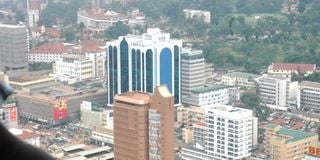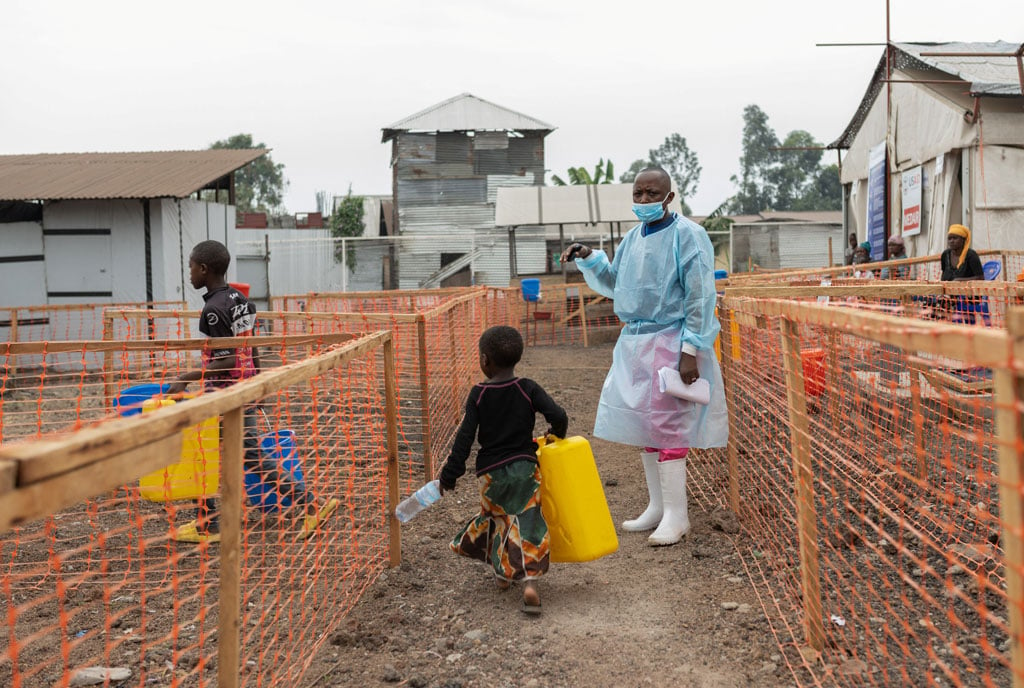Prime
Does Kampala deserve ranking as best capital city in East Africa?

An aerial view of part of Kampala City Central Business District. A study by Mercer, a New York-based global human resources consulting firm, has revealed Kampala is the best city to live in East Africa.
What you need to know:
The best East African capital city to live in is Kampala. This is according to Mercer, a global human resources consulting firm based in New York City. We find out whether indeed Kampala City deserves the spot.
Kampala, without a doubt faces challenges. Besides the annoying traffic jam that often leaves motorists cursing behind their wheels, there is the congestion, noise pollution, potholes, poor drainage channels, among other issues that continue to irritate people living, visiting or conducting business in the city.
It is no wonder that some sections of Ugandan society were puzzled by the latest Quality of Life Survey conducted by Mercer, a global human resources consulting firm, ranking Kampala as the best East African capital city to live in.
Kampala is placed in 169th position, ahead of Nairobi (184), Kigali (191) and Dar es Salaam at 198.
The only African cities that scooped positions in the top 100 included: Durban, Cape Town and Johannesburg ranking 85, 92, and 95 respectively. Baghdad (230) ranks lowest worldwide.
Vienna retains the top spot as the world’s best city having topped the last seven published rankings. The study which was done between September and November 2015 examines social and economic conditions, terrorism threats, health, education, housing and the environment in making its judgement.
The study is one of the world’s most comprehensive, and is conducted annually to enable multinational companies and other employers to compensate employees fairly when placing them on international assignments.
Experts’ thoughts
Ramathan Ggoobi, an economics lecturer at Makerere University Business School says some sections of Ugandans get surprised by such surveys because they do not except a city like Kampala which is congested with poor infrastructure to beat her neighbouring countries which are more developed and better organised.
“Kampala city may be poor but what makes her liveable are not the resources or infrastructure but rather the people themselves, culture, food, weather and most importantly the policy framework,” Ggoobi says.
“Many of our neighbours have closed kind of countries. Kigali for instance is very neat but then one cannot easily express him or herself while there. The levels of happiness there are low.”
In addition, Ggoobi states that this also has to do with the aspect that many foreigners feel at home while here.
“Ugandans tend to be really hospitable. Authorities like police and traffic officers actually respect foreigners more than their own people. Whenever they see someone with a different skin colour, they are treated as a VIP (Very Important Person) and at the end of the day, you will have such people only saying positive things about the country,” Ggoobi notes.
On the other hand, Jean Byamugisha, the executive director of the Uganda Hotel Owners Association, says that it is because of the good relations that Kampala has with her neighbours that big brand international hotels always want to invest here.
“A booming hotel sector is a clear indication to the world that the city is open for business and in this case, making Kampala one of the best in Africa,” Byamugisha says. “Investors have confidence in Kampala as a viable investment option, and this is usually from thousands of options worldwide.”
Questions about the survey
Meanwhile, Joseph Ntayi, a professor of Computing and Management Science at Makerere University Business School (MUBS) thinks the positioning of Kampala in the survey depended on a weighted index bringing together many variables that constitute the quality of living.
“The results are not surprising given the factors that were used to analyse the living conditions implying that the results of the survey should be read with caution. For example, the study is silent on the conceptualisation of the quality of living and the methodology used to collect and analyse the data,” Ntayi says, adding: “I also think that little consideration was paid to the quality of data collected in terms of dimensions like medical and health considerations, public services and transport, recreation among others. Therefore, this raises glaring conceptual and methodological weaknesses to the survey.”
Other than that, Ntayi says the results of the survey need to be validated before drawing conclusions.
“They are explanatory in nature and a pointer in what we probably have not critically thought about. However, it is important that we also conceptualise and undertake another study to confirm them,” he says.
On what it means for Kampala to be ranked the best city, Ntayi states that it zeroes back to people visiting Kampala ordinarily as well as enjoying a better quality of living based on consumer goods, economic environment, housing, medical and health considerations, natural environment, political and social environment, public services and transport, recreation, hygiene, schools and education, socio-cultural environment than their counterparts visiting other capitals in East Africa.
Such observations notwithstanding, Ntayi states that Uganda’s economy continues to perform well compared to the economies of other East African countries.
Therefore, this gives the country leverage in terms of the quality of living, compared to the other East African countries.
The statistics
According to Numbeo, a collaborative online database which enables users to share and compare information about the cost of living between countries and cities, consumer prices, including rent in Uganda are 13.52 per cent lower than in Kenya, rent prices in Uganda are 40.55 per cent lower than in Kenya, restaurant prices in Uganda are 27.94 per cent lower than in Kenya, groceries prices in Uganda are 16.10 per cent lower than in Kenya, local purchasing power in Uganda is 27.40 per cent lower than in Kenya.
Additionally, a critical comparison of Uganda with Tanzania along the same criteria gives Uganda an advantage. Consumer prices in Tanzania are 34.26 per cent higher than in Uganda, consumer prices including rent in Tanzania are 68.90 per cent higher than in Uganda. Rent prices in Tanzania are 264.48 per cent higher than in Uganda, restaurant prices in Tanzania are 75.74 per cent higher than in Uganda. Groceries prices in Tanzania are 33.59 per cent higher than in Uganda, local purchasing power in Tanzania is 128.66 per cent higher than in Uganda. These aspects put together confirm the survey results by Mercer.
Despite the slow growth of the economy, income levels in the formal sector continue to improve compared to the informal sector. The real growth rate for Uganda is estimated at 5.6 per cent while that of Tanzania is 7 per cent and Kenya is 5.1 per cent. The population below poverty line in Uganda is about 24.5 per cent while that of Tanzania is 36 per cent and Kenya at 43.4 per cent. Uganda’s unemployment for youth ages 15 to 24 is estimated at about 5.4 per cent compared to that of Tanzania which is estimated at about 7.1 per cent.
Notwithstanding the impressive results of the Mercer study, employment opportunities for the youth in Uganda continue to dwindle due to the shrinking economy compared to the rapid population growth rate.
Security levels in the city
In terms of security, Patrick Onyango, the Kampala Metropolitan police spokesperson, says Kampala is more secure than neighbouring cities.
“There are streets in those cities you cannot walk on during daytime but it is a different case in Kampala. Here, you can freely move either during day or night time,” Onyango says.” “Police officers are also visible as they are often patrolling the streets and very approachable to foreigners whom we treat with courtesy.”
But most importantly, Onyango says crime rates have also reduced as depicted in the 2015 crime report covered from the period of January to June, indicating that the security situation in the country is generally stable and the crime rate is on a downward trend. The statistics are depicted as follows:
• 3,612 cases of robbery were reported compared to 4,402 cases in 2014.
• 6,490 cases of breakings were reported compared to 7,501 cases in 2014 over the same period giving a decrease of 13.4 per cent.
• 3, 536 cases of burglaries were reported compared to 4, 222 cases in 2014 over the same period giving a decrease of 16.2 per cent.
• 10,163 cases of sex-related offences were reported compared to 10,769 cases in 2014 over the same period giving a decrease of 5.6 per cent.
• 9,609 cases of economic crimes such as embezzlement and abuse of office were reported compared to 12,180 cases in 2014 over the same period giving a decrease of 21. 1 per cent
• 7, 408 cases of child-related offences such as kidnap and torture were reported compared to 7,281 cases in 2014 over the same period giving an increase of 1.7 per cent.
• 18,509 cases of thefts were reported compared to 21, 578 cases in 2014 over the same period giving a decrease of 14. 2 per cent.
• 24, 023 cases of assaults were reported compared to 24,039 cases in 2014 over the same period giving a decrease of 0.1 per cent.
• 1,161 cases of narcotics such as cocaine and heroin were reported compared to 1,244 cases in 2014 over the same period giving a 6.6 per cent decrease.
Foreign relations
Uganda enjoys “excellent relations” with regional neighbours, Ministry of Foreign Affairs Permanent Secretary James Mugume told Daily Monitor last month.
Trade, for which South Sudan provides the biggest export market, common interest in integration of East Africa and transnational anti-terrorism operations have brought East African countries closer.
The lead role played by the UPDF in Somalia and South Sudan, has given Uganda diplomatic clout and distinguished prominence as a peace-maker and regional policeman.
This engagement in regional peace and security operations have for long made Uganda a strong ally, particularly of the United States, enabling the latter to invest millions of dollars training UPDF soldiers, logistical and military hardware support and bolstering the Uganda military’s intelligence capability.
It’s global influence was manifested in Foreign Affairs minister Sam Kutesa chairing the 79th United Nations General Assembly last year and, a few years earlier, now Prime Minister Ruhakana Rugunda chairing the UN Security Council when he was Uganda’s Permanent Representative to the world body.
Although small in size and landlocked, Uganda has projected a larger-than-life stature, confounding critics and sceptics around the world.
For instance, it pulled last-minute diplomatic strings three years ago to have Julia Sebutinde elected by the UN General Assembly as one of the 15 judges of the International Court of Justice in spite of stiff competition by West Africa.
And its long-serving President Yoweri Museveni is the official mediator to resolve the Burundi crisis.
Pursuing a foreign policy based on its national interests - promoting good neighbourliness, pan-Africanism, trade, tourism and investment - Uganda has, by refusing to ally with either the West or East avoided the mistake of ideological conflict and survived to benefit across the board, including from rival countries.
It is unsurprising, therefore, that Mercer rated it better in East Africa based, among other things, on its great relations with other countries.
Ranking of other cities
Europe
Western European cities enjoy some of the highest quality of living worldwide as depicted in their position:
• Vienna (1)
• Zurich (2)
• Munich (4)
• Dusseldorf (6)
• Frankfurt (7)
• Geneva (8)
• Copenhagen (9)
Prague is the highest ranking city in Central and Eastern Europe, followed by:
• Ljubljana (76)
• Budapest (77)
The lowest ranking cities in Europe:
• Kiev (176)
• Tirana (179)
• Minsk (190)
European cities also dominate the top of the personal safety ranking with Luxembourg in the lead, followed by Bern, Helsinki, and Zurich, which are tied for the number-two spot. A number of key cities rank considerably lower as many suffered either terrorist attacks or social unrest in the last few years for instance;
• Paris (71)
• London (72)
• Madrid (84),
• Athens (124)
Americas
Quality of Living remains high in North America, where Canadian cities dominate the top of the list.
• Vancouver (5)
• Toronto (15)
• Ottawa (17)
In the United States:
• San Francisco (28) ranks highest for quality of living
• Boston (34)
• Honolulu (35)
• Chicago (43)
• New York City (44)
Asia-Pacific, which has considerable variation in the quality of living
• Singapore remains its highest ranking city (26)
• Dhaka (214) is the lowest.
Additional reporting by Tabu Butagira




